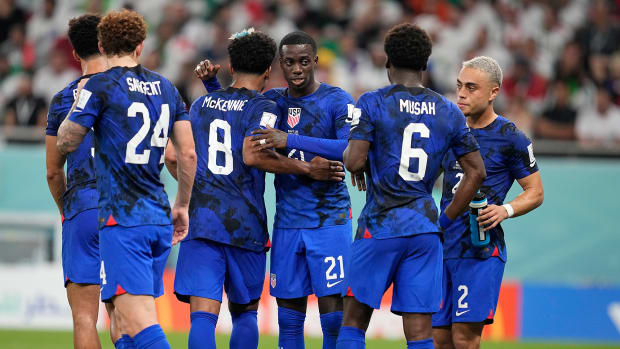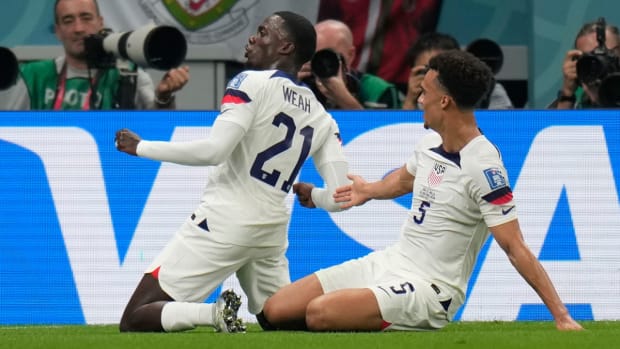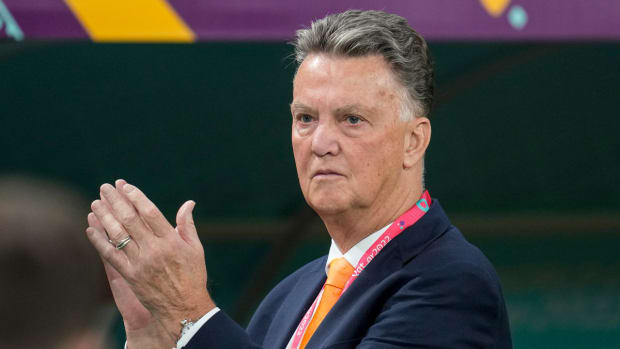Playing a European power for a place in the quarters is not something the U.S. is taking lightly, even if the mood on the eve of the match was relaxed.
AL RAYYAN, Qatar — The mood here Friday at the Qatar National Convention Centre couldn’t have been more different than that of four days earlier, when U.S. men’s national team coach Gregg Berhalter and captain Tyler Adams were subjected to a 30-minute siege by Iranian reporters who grilled the Americans on off-topic issues like naval strategy and immigration.
At Friday’s pre-match press conference, which preceded Saturday’s World Cup round-of-16 showdown between the U.S. and the Netherlands here in the Doha suburbs, the manager and player had a lot more fun. Berhalter told a couple amusing stories about his time as an Eredivisie defender, took a question in Dutch (he understood it, but answered in English), asked a Brazilian reporter for some intel on Saturday’s referee and even ribbed his captain a bit for not playing more diagonal passes. It was an afternoon of relaxed give-and-take.
Adams, in turn, announced, “That’s his job!” when asked for an Oranje scouting report, went into affectionate detail about several U.S. teammates and at one point said simply, “I’m very happy to talk about football.”
Watch the World Cup with fuboTV. Start your free trial today.
The more genial tone surely was a factor in their livelier mood, but so was the timing. Berhalter has been saying for months that the World Cup really is two tournaments—a group stage that’s about managing a roster and accruing points over three games, and then the knockout rounds, which are do-or-die. U.S. Soccer is at a point in its development where progression from the group to the last 16 is the standard—the dividing line between World Cup success and failure (fittingly, the U.S. is currently ranked 16th by FIFA). The pressure ahead of Tuesday’s climactic Group B game against Iran was massive. But after that, there’s only opportunity.

Ebrahim Noroozi/AP
Expecting the American men to win a World Cup elimination match is to expect them to achieve something that’s been done only once in 92 years. Expecting them to defeat a European nation is to expect them to do something they’ve managed only once in 19 World Cup matches since returning to the competition in 1990.
But this is a different sort of U.S. team—youthful, exuberant, energetic and filled with players who see the likes of the Dutch on a weekly basis at the club level. Expectation and belief aren’t the same thing. And after weathering a nail-biting first round that featured draws against Wales and powerhouse England and then Tuesday’s gritty 1-0 win over Iran, this U.S. side, which came to Qatar confident, has little to lose against a Dutch squad that’s looked far from unbeatable.
“For us, we’re going to win. I came here saying to everybody—the media and everybody—that we're coming here to try to win,” forward Brenden Aaronson said after the Iran triumph. “For me also, going into the next game, we may be the underdog. The Dutch are a world power, and they've been that for many, many tournaments. So I think for us, it's just going in there with no fear and playing the way we have been this entire tournament, and I think good things will come out of it.”
Speaking Friday, Adams, who’s been a commanding presence on and off the field in Qatar, knew that the Oranje, a three-time World Cup runner-up, are unbeaten in 18 games since veteran coach Louis van Gaal returned in September 2021. Adams has been on top of everything.
“The first thing you see is obviously the amount of quality that they have in their team,” he said. “Every single player plays at a high level. Going into this game, we know we're gonna have to be up for the fight because when you're playing against that much quality, you're able to limit them, but for how long?
“So we know we're going to have to give it our all, but I think that's where our mentality has been really, really good against some of the biggest opponents,” he continued. “We haven't looked at [World Cup matches] as a 90 minute game. We've taken every game minute by minute, living in the moment, staying present, and that's been the most important thing for us.”

Aijaz Rahi/AP
Knockout rounds can go beyond 90 minutes of course—all the way to 120 and then, if still level, a penalty shootout. Preparing for all that is part of getting ready for this second tournament within a tournament, Berhalter said. Nine players, including Adams, who’s played every minute, started each of the three group-stage games. The primary health questions heading toward Saturday concern Christian Pulisic, who suffered a pelvic contusion while scoring the game-winner against Iran, and striker Josh Sargent, who injured his right ankle in the second half.
Pulisic was cleared by U.S. Soccer, but Berhalter was a “little less” hopeful about Sargent’s prospects.
“This stage is go time. If you can push through, you do. So I'm sure he'll have that mindset,” Berhalter said.
The U.S. has had an eye on the Netherlands, the prohibitive Group A favorite for almost a year—even before the World Cup draw.
“We've been watching Holland for the last 11 months, watching all their games,” Berhalter said. “We’ve had multiple people at their group-stage games watching live. We had the wide angle [video], so [we’re] really doing a deep dive on them. All that information was presented to us immediately after the game against Iran, and we started preparing.
“In this knockout stage, anything [can] make the difference in the result,” he continued. “You have to be patient. You also have to realize that it could be a 120-minute exercise, and you have to plan your lineups and substitutions accordingly. So we're game planning all that, and then finally [you could] have the penalty kicks, which we practiced yesterday and we'll practice again today.”
The U.S. is 4-2 all-time in penalty shootouts, but it’s never endured one at a World Cup and has been involved in just one in the past 17 years (a loss to Panama in the 2015 Gold Cup third-place game).

Natacha Pisarenko/AP
van Gaal and the Oranje fell in the 2014 World Cup semis on penalties to Argentina. That team scored 12 goals in its first four games in Brazil before the attack dried up. Nevertheless, van Gaal said Friday that one thing he remembers from that tournament is the criticism back home, which Berhalter said seems to be an integral component of Dutch football culture. Despite finishing this World Cup’s group stage 2-0-1 with a +4 goal differential, the Netherlands’ play has hardly set Qatar alight. It’s often looked turgid and devoid of ideas, and van Gaal has the efficiency of PSV Eindhoven attacker Cody Gakpo (three goals) largely to thank for a first-place finish.
“In 2014, it was exactly the same. It was no different. It was very negative,” van Gaal said. “So, it’s the exact same thing now. Same old. So I’m used to it, and I think my players are also used to it. So we are just calmly going to continue on the path that we have embarked on.”
Both teams have been stout defensively—the U.S. has yielded only one goal, and that came via penalty kick—and have had some difficulty turning advantages gained during the run of play into clear-cut scoring chances. There might be some space for the Americans to exploit to the right and left of the Dutch back three, which is anchored by Liverpool’s Virgil van Dijk, but goals are likely going to be at a premium on Saturday. Like every U.S. World Cup match, this one looks like it’ll be decided by the slimmest of margins.
“It's going to be a physical battle, but all the games have been,” Adams said. “Sometimes cramping sets in and sometimes fatigue sets in, but in these games and these moments, you mentally have to be strong to battle through.”
van Gaal is also expecting a difficult match despite the history.
“I’ve already said that the USA is a very energetic squad, with physically strong players. That is tough for any opponent, and you can tell from their results,” he said.
“I think that they’ve evolved well. It’s typically American—I would say that they evolve rapidly and they have many players in European top clubs. So it goes without saying that they would perform and achieve these results,” he added. “I think they are an example of what a good team is supposed to be.”
There’s been ample praise here in Qatar from non-U.S. sources for the Americans’ resolute group-stage performance and for the way this young group, especially Adams, has handled the World Cup spotlight. Home fans almost everywhere are typically the hardest to please. And it’s true that the U.S. has struggled to score, that it’s made really hard work of the second halves of its games, and that it’s been poor on set pieces. It’s hard to have a perfect World Cup. But at least the Americans got through the first one, as Berhalter likes to describe it, and now, if they can make progress in the second, they’ll make a very different sort of statement.
“My dad's a teacher at school and they were all watching the game during their classes, supporting me. And I was getting videos from the family, all the watch parties in my town and whatnot. But it's really, really cool to see how much just a tournament can change the perspective on people supporting soccer,” Adams said.
“The farther we go the more support that we gather, and that's what we want. We want the next generation and generations to come to have that support behind them. When we can play an attractive style and [are] fighting to represent the country in the right way, you're gonna gather that support.”